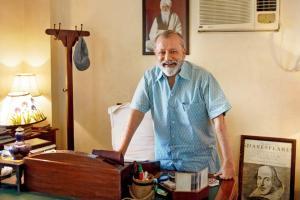Pankaj Kapur turns novelist with a fiction set in Lucknow about an old woman and her buried ambitions

Pankaj Kapur
Twenty seven years seems like a very long time to live with a story. Veteran actor-director Pankaj Kapur says his debut novel, Dopehri (HarperCollins India), which releases in Hindi and English later this month, has been with him all this time. It has aged like wine, Kapur thinks aloud, when we meet him at his Versova office. It is here that the piece of fiction, which started as an exercise in writing for a film, witnessed many lives. The room has a touch of the old. There is an antique writing desk placed on a wooden table, and dim lamps that lend the space a warm glow. Kapur, 65, points to the seating area outside.
ADVERTISEMENT
"Before this became my office, it was my home. This is where I first read Dopehri to my dear friend, poet and writer Akshay Upadhyay, in 1992. After listening to it, he insisted that we print it. He took the manuscript from my wife Supriya, and sent it to Bhopal, where it was published in a literary magazine," he remembers. Soon after, Ram Gopal Bajaj, director of the National School of Drama, Kapur's alma mater, visited him, convincing him to read it on stage. That's how Dopehri made its theatre debut in 1996, everywhere but in Mumbai. "For some reason, people were not ready to give me their theatres, because it was a reading. I must confess, I was dejected." It would take him another 20 years, before he could bring the show to his home city. That it opened to packed houses, reaffirmed his faith in the work.
Publishing the novel was Supriya's idea. Kapur calls it "her hard work". Originally written and performed in Hindustani, the 95-page novella has been translated into English by Rahul Soni, and tells the story of Amma Bi, a lonely sixty-five-year-old aristocrat from Lucknow, who is riding into the sunset. Her only son Javed has moved to the US with his family, and she is left at the mercy of her petulant house help, Jumman. When, on the insistence of a family friend, Saxena Saheb, the only person she trusts, Amma Bi gets a paying guest, she experiences an epiphany.
"Before I began writing, I thought I'd set it in a house in Dadar Parsi Colony, where there are big, wooden staircases, and if you sit [in a home], you can hear footsteps of people, going up and down. But strangely enough, the moment I sat down to write, the first word that intuitively emerged from my pen was Amma Bi. When Amma Bi happened, the story got transported to Lucknow, and everything else flowed from there." Writing in Hindustani was effortless for him. "I have no idea where I picked up the texture of the language," says Kapur, who hails from Punjab. "The only reason I can think why it happened is that I schooled at the National School of Drama, where Urdu was an important part of theatre. Probably, while staging plays, I might have developed a sense for it."
Kapur spent a significant part of his childhood listening to his father, AP Kapur, an English professor and a delicious raconteur, who introduced him to everything from Shakespeare to popular folklore. And so, writing came naturally. "But I am not a disciplined writer," he admits. "I write poetry here and there. For me, it needs to be instinctive. I can't force myself." Even Dopehri, he says, happened organically. "I must confess this and emphatically, that Dopehri dawned on me. People will find it strange, but I wrote it in four days. I put pen to paper, and didn't stop."
Though he is as comfortable in English, as he is in Hindustani, Kapur chose not to translate the novel. "It would have been a huge burden. I wrote this 25 years ago. Any attempt to perfect the story, the way I had conceived it in Hindustani then, would have taken at least a year-and-a-half. Also, since it's a story that has been with me all along, I wanted to take a step back and let somebody else look at it from today's perspective, and give it the words that the youth will relate to."
The publishers tried a few translators, before Kapur warmed to Soni's translation. "The first version [of the translation] came from a very famous translator, and it read very well in English. But, it was far away from the original. For me, it was important that the way the characters feel and express, was retained." The two worked on it together, till they were completely satisfied. "It might take an English reader a chapter or two to get used to the language, but once you do, it's intriguing. Soni and the publishers have been sensitive to my work. In my foreword, I have said that Soni has indulged me. In Hindustani, I'd say, 'usne mujhe kaafi bardasht kiya.'"
What Kapur hopes this book will do is leave the reader nostalgic, especially of the elderly, who spend much of their life selflessly. "The pages of this book are filled with emotions: there is humour, pathos, loneliness, warmth and friendship. It's the story of our dadis and mothers, who might have had the ambition to be someone else. Has anyone ever sat down and asked their mothers, Do you want to do something for yourself? I'd like to support it.'"
Catch up on all the latest Mumbai news, crime news, current affairs, and also a complete guide on Mumbai from food to things to do and events across the city here. Also download the new mid-day Android and iOS apps to get latest updates
 Subscribe today by clicking the link and stay updated with the latest news!" Click here!
Subscribe today by clicking the link and stay updated with the latest news!" Click here!






